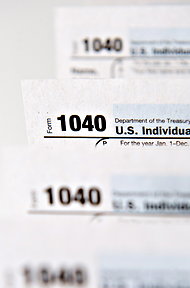 Bloomberg News
Bloomberg News
This is the last tax season that any banks will be offering “refund anticipation loans,” according to the National Consumer Law Center. The loans, called R.A.L.’s in the industry, are short term, repaid with a borrower’s income tax refund. Typically, the loans carried fat fees and were marketed through tax-preparation outlets to lower-income borrowers who wanted fast cash.
Recent action by federal regulators means that just one bank, the Republic Bank Trust Company of Louisville, Ky., is offering the loans this tax season. But it won’t be doing so next year, under a settlement with the Federal Deposit Insurance Corporation. (It’s possible that some smaller payday lenders, which until recently haven’t had much federal oversight, may still offer some version of the loans.) This year, according to the consumer law center, filers who get a $1,500 refund anticipation loan from Republic through the Jackson Hewitt tax preparation chain will pay at least $61.22, which translates into an annual percentage rate of 149 percent. Jackson Hewitt didn’t immediately respond to a request for comment.
An estimated five million people received the loans in the 2010 tax filing season, according to the National Consumer Law Center. But there are cheaper or even free ways for tax filers to get the cash expected from their refunds relatively quickly, said Chi Chi Wu, a staff lawyer at the center.
If you have a bank account and file your tax return electronically, you can have your refund deposited automatically in two weeks or less.
If you lack a bank account, you can still file electronically and get the refund quickly on a prepaid card — including a payroll or other card that you may already have.
(The Internal Revenue Service sponsors free tax preparation and, in many cases, free electronic filing for low-income and elderly filers, through its Volunteer Income Tax Assistance and Tax Counseling for the Elderly programs. The AARP Foundation also sponsors free tax preparation services. And there’s also free help for many filers on the I.R.S.Web site.)
Unbanked customers may also consider a “refund anticipation check,” — but only if it’s free, Ms. Wu said. HR Block, which stopped offering the refund anticipation loans last year, is offering free refund anticipation checks until Feb. 4, if customers get their refunds on Block’s prepaid Emerald Card. HR Block didn’t immediately respond to a request for comment.
The checks are aimed at letting customers avoid paying upfront for their tax preparation. The check isn’t a loan. Rather, a bank sets up a temporary account to receive the refund from the I.R.S. Then, the bank issues the customer a check or prepaid card — minus the tax preparation fee, and any other fees — and closes the account. Banks usually charge around $30 for the checks, the consumer law center says.
While prepaid cards can be a good option for those without bank accounts, Ms. Wu notes that they can carry significant fees, too, so consumers must make sure they know the costs involved with using a particular card.
Have you ever used a refund anticipation loan, or a refund anticipation check? How much did it cost you?
Article source: http://feeds.nytimes.com/click.phdo?i=1564bae085089ea48e847fb825e3233d